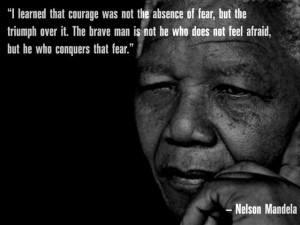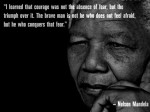 Nelson Mandela once said “Courage was not the absence of fear, but the triumph over it. The brave man is not he who does not feel afraid, but he who conquers that fear.”
Nelson Mandela once said “Courage was not the absence of fear, but the triumph over it. The brave man is not he who does not feel afraid, but he who conquers that fear.”
This is a great insight.
Although maybe John Wayne said it slightly better: “Courage is being scared to death and saddling up anyway.”
People sometimes think that the courageous person does not feel fear in the midst of great danger and potential personal harm. But this is not true. If someone is facing great danger and they feel no fear, they are not courageous, but ignorant and foolish. Fear is natural and normal in dangerous situations. The courageous person is not someone who feels no fear, but who runs headlong into danger despite the fear.
Yet while I like this understanding of courage, it is usually only applied to acts of valor that we might see on a battlefield or in a daring rescue operation. We think of the soldier who charges forward against a spray of enemy bullets to rescue a wounded comrade. We think of a policeman who stands alone against criminals intent on doing harm, holding them back until reinforcements arrive. We think of firemen who enter burning buildings to pull terrified children from the flames.
These are all, undoubtedly, great acts of courage. But I do not think they are the greatest possible act of courage. No, the greatest possible act of courage is the courage it takes to forgive.
The Courage to Forgive
When we are wronged, slandered, hurt, or abused, our entire body, soul, and spirit screams against the idea of forgiveness. We want revenge! We want retaliation! We want the person who did us wrong to suffer as we have suffered.
But more than that, we do not want to be hurt in the same way again. We fear that if we forgive someone for what they have done, they will continue to abuse and hurt us in similar ways.
From experience, we know that forgiveness rarely changes the person who did wrong. They often continue to do and say that the hurtful and damaging things that they have always done. So we fear that forgiveness is enablement. That forgiveness will allow the abuse to continue. That forgiveness will cause the other person to think their actions are okay. We don’t want that to happen. We are afraid of that happening. And so we don’t forgive.
The Courage of Jesus
But our example is Jesus. As He hung on the cross, dying for sins He did not commit, slandered for doing what He did not do, and suffering great pain which He wrongly received, He said, “Father, forgive them, for they know not what they do.” His forgiveness was not dependent upon them understanding what they had done. His forgiveness was not conditional on Him making sure they would never do such things again. His forgiveness did not require that they never treat Him in this way again.
 Yet still He forgave. Jesus faced the fear that His forgiveness would continue to allow them to live in ignorance, to treat others as He was being treated, or to understand who He was or why He came.
Yet still He forgave. Jesus faced the fear that His forgiveness would continue to allow them to live in ignorance, to treat others as He was being treated, or to understand who He was or why He came.
Thankfully, we are not all faced with the difficulty of offering forgiveness to our murderers. But forgiveness is an ordinary, everyday courage that we all have the opportunity to show. When parents are unloving. When spouses cheat. When children say hurtful things. When employers treat us unfairly. When neighbors are rude. When neighbors slander, mock, and malign. In all these cases, and countless more, the courage to forgive is one of the greatest examples of courage that exists.
True courage is found in the willingness to forgive when everyone around you and everything within you is screaming for revenge. In these times, we must face the fear of what will happen if we forgive, and have the bravery to conquer that fear by saying these two most courageous words: “I forgive.”
Running headlong into danger is an act of courage, but not the greatest act of courage. The greatest act of courage is found in forgiveness. So take heart! Have courage and forgive.
This post was part of the June 2013 Synchroblog. Go read all the excellent posts from the other contributors:
- This Is Courage by Jen Bradbury
- Being Vulnerable by Phil Lancaster
- Everyday Bravery: Overcoming the Fear of Being Wrong by Jessica
- Moving Forward Takes Courage by Paul W. Meier
- How to Become a Flasher by Glenn Hager
- Ordinary Courage by Elaine Hansen
- Courage, Hope, Generosity by Carol Kuniholm
- The Courage to Fail by Wendy McCaig
- Sharing One’s Heart by K. W. Leslie
- All I See Is Rocks by Tim Nichols
- I Wonder What Would Happen by Liz Dyer
- What is Ordinary Courage? by Jennifer Stahl
- Loving Courageously by Doreen A. Mannion
- Heart Cry: The Courage to Confess by Elizabeth Chapin
- The Act to the Miraculous by VisionHub
- the spiritual practice of showing up & telling the truth by Kathy Escobar




Paul,
That is right. Faith helps us see something better for our own actions and our relationships with others, and live in hope of that better vision.
Wendy,
Don’t beat yourself up! Forgiveness is SO difficult!
Margaret,
Great point. I didn’t define forgiveness.
Of course, I am torn on the subject. God, who forgives perfectly, seems to allow the abuse to continue, and he keeps forgiving! But there are consequences to sin, which He does not always protect us from. So in a human relationship, I think we can forgive, but also allow the consequences of the behavior to run their course, which might be a broken or permanently damaged relationship.
Doreen,
Whatever happened to you, I am very sorry it happened. I hope you do not feel I am lessening the pain of your experience.
Even if you never find him, you can forgive him in your own heart and mind so that you gain freedom from the pain he caused.
Very true, Jeremy, and that is more than enough as the likelihood I’ll ever find him is remote.
Thanks, Phil. I hope it does launch some toward forgiveness!
Yes. I often think that forgiveness is more for us than for the person who wronged us. As long as we do not forgive, the person who hurt us continues to hurt us, even if we never see them again.
You are also right that even though we forgive, this does not mean there are not consequences. Distance in the relationship may be necessary,
And yes, there is an amazing lack of forgiveness in the life of many religious people. I think it might be because religious people are taught that sin has consequences (which it does), but then we feel that it is OUR job to make sinners suffer the consequences, and so we withhold forgiveness until we see them suffer.